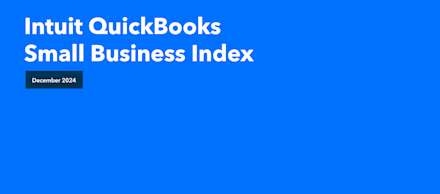
Intuit QuickBooks Small Business Index, December 2024
Simple, smart accounting software - no commitment, cancel anytime

FINANCE, BUDGETS AND CASHFLOW
Updated 07 November 2022.
Statistics from recent studies have revealed that small businesses are dealing with more late payments than ever. QuickBooks have outlined the facts and analysed how PayPal can improve your business’s cash flow to reduce the stress.
A recent QuickBooks’ study[1] has found that the average amount owed to small businesses with at least one overdue invoice has risen 6% year on year.
This is an increase to £22.7k in May 2022, from £21.4k the previous year – which is 65% [2] of the average small business’ typical monthly turnover.
Meanwhile, almost two-thirds (65%) of invoices owed to small businesses were overdue within the month of May this year (2022). In the same period last year (2021) this figure was 63%. As the cost-of-living crisis intensifies, it’s having a notable impact on small businesses.
These findings add to the already concerning results of a recent study by the Federation for Small Businesses (FSB) earlier this month. It found that half of the 1,300 small business owners and sole traders surveyed between April and June 2022 reported being paid late, while one in five said the issue was getting worse.
A recent study of QuickBooks customers[3] found that for the first time since last year cash flow appeared to deteriorate in March 2022. The number of small businesses reporting negative cash flow rose nine percentage points since January to 46%.
The decline in cash flow appears to stem from less ‘money in’ for these businesses, coupled with increased costs. Alongside fewer invoices being paid on time (dropping to just 45% in March, down from 57% in January), small businesses are also dealing with price increases from suppliers and general running costs.
One of the biggest pain points for small businesses at the moment is rising energy bills, with just under half (48%) reporting an increase. A rise in the cost of fuel for business vehicles was another issue (34%), as was an increase in costs for raw materials and stock (31%). As a result, one in three small businesses has said they have had to increase their prices, while others are looking to cut costs and increase their cash reserves.
Yet despite these rising costs, small businesses report that their level of confidence remains stable and the same as January 2022, with 68% of small businesses saying they are confident in their financial stability.
Jolawn Victor, Vice President and UK Country Manager, Intuit QuickBooks, says: “Tighter profit margins and limited cash flow mean that the rising cost-of-living is even more of a burden for the smallest businesses. Now we’re seeing that, as ever, it’s these businesses who are impacted most by late payments.”
“There are however effective ways for small businesses to arm themselves against this issue. Investing in digital software with specially designed features - such as invoice tracking and automated reminders - means small business owners can avoid wasting time on awkward calls and emails.”
“It is great to see that confidence among small businesses remains high despite the challenges being thrown at them. Their resilience is commendable, but it’s important to know that there is support out there. Automating back office processes can reduce stress and help small business owners save valuable time, allowing them to focus on what is really important: running their business.”
Overdue payments have a significant impact on small businesses like yours. Research commissioned by Intuit QuickBooks showed that business owners spend around 56.4 million hours annually chasing overdue and late payments. This means that, on average, businesses waste over 5 days every year chasing money that’s owed to them. Rather than chasing payments, most businesses would rather spend this time focusing on activities such as business development.*
Pay-enabled invoicing with PayPal can help you to get paid quickly, with automatic reminders for late payers because no matter what your business is, getting paid on time is critical.
Your customers can easily use the PayPal online payments feature, which integrates seamlessly with QuickBooks, to improve your business’ cash flow. So you can focus on what matters most - growing your business.
Learn more about integrating PayPal and QuickBooks.
Get paid fast - Send invoices on the go and add a 'Pay now' button for straightforward, fast payments.
Forget chasing payments - Schedule reminders in QuickBooks to automatically let your customers know about upcoming or overdue invoices.
Help boost your cash flow with easy payments - Customers can pay your invoices online with their credit card, debit card or PayPal reducing the time from invoice to payment.
Save hours of admin - PayPal payments and fees are automatically recorded and reconciled in QuickBooks, saving you time so you can focus on running your business.
1. Sign in or sign up to QuickBooks Online. When you first create a pay-enabled invoice select the Accept Card Payments with PayPal option.
2. Authorise your QuickBooks account to connect to your PayPal account and confirm via the confirmation email.
3. Create an invoice and make sure the checkbox Accept Card Payments with PayPal is ticked. Then send the invoice.
That's it.
For more information visit - https://quickbooks.intuit.com/uk/payments/paypal/
Q: Will the Accept Card Payments with PayPal help save time entering PayPal transactions?
A: Yes. When your QuickBooks account integrates with PayPal, payments received through PayPal automatically reconcile with QuickBooks. This includes recording information including items sold, quantity, discount, taxes, etc. PayPal fees are also imported as an expense into your QuickBooks account.
Q: What if I already have a QuickBooks account but don’t have a PayPal account yet?
A: If you don’t have a PayPal business account, create one here.
Q: What if I already have both a QuickBooks and a PayPal account?
A: Great. Simply select the ‘Accept Card Payments with PayPal’ tickbox when you’re creating an invoice in your QuickBooks account. You can then use PayPal to receive payments in QuickBooks.
Q: How does the Accept Card Payments with PayPal work?
A: Connecting the Accept Card Payments with PayPal is quick, easy, and secure, and means you can send invoices with a ‘Pay now’ button. Your customers can then make online payments using PayPal, or major credit cards such as Visa, MasterCard, or American Express. You’ll receive payments in your PayPal account and the accounting will be done in QuickBooks.
Q: How much does the Accept Card payments with PayPal app cost?
A: You’ll need a UK QuickBooks account and a UK PayPal business account. PayPal merchant transaction fees apply for receiving online payments. As a QuickBooks customer, you get better rates when taking a payment through a pay enabled invoice.
* Independent research conducted by Opinium on behalf of Intuit QuickBooks with 506 UK SMB decision makers during October 2019.
56.4 million hours spent chasing late payments, based on research findings* and data from Business Population Estimates for the UK and Regions 2018: Detailed Tables, the following has been inferred:
1 Anonymised aggregate data from Intuit QuickBooks’s entire UK customer base. A snapshot of the late payments issues faced by SMBs in the UK today.
2 For SMBs in the private sector only. Government business population statistics (7 October 2021) state there are 5,583,245 private sector SMEs (0-249 employees) in the UK, with an average turnover of £2.3 trillion (£2,309,836,000,000). The average annual turnover is therefore £413,709. Dividing this by 12 gives the average monthly turnover of £34,475.75.
3 Based on a survey of 500 UK small business owners and SMB key decision makers. In field 26 March - 4 April.
(No. of UK businesses by size) x (%age of those that chase) x (Ave time chasing over year) / 60 +…. repeated for each size of business
(5,416,000 micros x 59.6% x 806mins /60) + (210,000 small x 90.3% x 3,416 mins / 60) + (35,000 med. x 90.6% x 4,254 / 60) = 56,407,500 hours
** Based on anonymised aggregated data from Intuit QuickBooks’s entire UK customer base. A snapshot of the late payments issues faced by SMBs in the UK 19 November 2021.
Feel you’re better informed about streamlining payments with PayPal? The QuickBooks blog covers a wide range of business-related topics – it’s all part of our mission to help small businesses grow.
9.00am - 5.30pm Monday - Thursday
9.00am - 4.30pm Friday